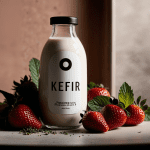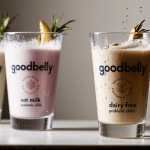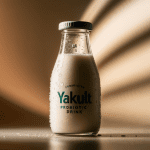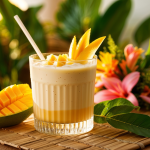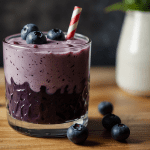To create a vegan version of a Yakult-style fermented drink, you can follow a simple recipe using plant-based ingredients. Here’s how to make it:
Vegan Yakult-Style Fermented Drink Recipe
Ingredients
- 1 can (14 oz) of full-fat coconut milk (or any other plant-based milk)
- 2 probiotic capsules (make sure they are vegan-friendly)
- Sweetener (optional, e.g., maple syrup or agave nectar, to taste)
Instructions
- Prepare the Coconut Milk: Shake the can of coconut milk well to ensure it’s mixed thoroughly. Pour it into a clean glass jar or bowl.
- Add Probiotics: Open the probiotic capsules and sprinkle the contents into the coconut milk. Stir gently to combine.
- Cover and Ferment: Cover the jar with cheesecloth or a clean kitchen towel to allow airflow while keeping contaminants out. Place it in a warm area (around 75-85°F or 24-29°C) for about 24 to 48 hours. The longer you let it ferment, the tangier it will become.
- Taste and Sweeten: After fermentation, taste your yogurt. If desired, add sweetener like maple syrup or agave nectar and stir well.
- Refrigerate: Transfer the fermented drink to the refrigerator, where it will thicken slightly and develop more flavor as it cools.
- Serve: Enjoy your homemade vegan Yakult-style drink chilled, either on its own or as a base for smoothies or desserts.
Notes
- Ensure all utensils and containers are clean to prevent contamination.
- You can experiment with different plant-based milks like almond or soy, but coconut milk typically yields a creamier texture.
- This drink is best consumed within a week for optimal freshness and probiotic benefits.
Best Non-Dairy Milks for Vegan Yakult
When making a vegan Yakult-style drink, the following non-dairy milks are recommended:
- Coconut Milk: Provides a creamy texture and rich flavor, ideal for fermentation.
- Almond Milk: A popular choice that is light and has a subtle nutty taste.
- Soy Milk: High in protein and can produce a thicker consistency.
- Oat Milk: Creamy and slightly sweet, it works well for fermentation.
These options are widely available and can be chosen based on personal taste preferences and dietary needs.
Alternative Probiotics
Instead of using Yakult, you can opt for other probiotic strains. Look for:
- Lactobacillus rhamnosus: Commonly found in many vegan probiotic supplements.
- Bifidobacterium bifidum: Another beneficial strain that supports gut health.
- Probiotic powders or capsules: Ensure they are vegan-friendly and contain live cultures.
These alternatives can provide similar gut health benefits as those found in Yakult.
Fermentation Time
Fermenting a vegan Yakult typically takes about 24 to 48 hours. The exact time may vary depending on the ambient temperature and the specific probiotic cultures used. Warmer temperatures generally speed up the fermentation process, while cooler environments may slow it down.
Flavor Variations
You can experiment with various flavors to customize your vegan Yakult:
- Fruit Purees: Add blended fruits like strawberries, mangoes, or blueberries for natural sweetness and flavor.
- Vanilla Extract: A small amount adds a pleasant aroma and taste.
- Cocoa Powder: For a chocolate-flavored version, mix in unsweetened cocoa powder.
- Spices: Cinnamon or ginger can introduce warmth and complexity.
Health Benefits of Almond Milk in Vegan Yakult
Almond milk offers several health benefits when used in vegan Yakult:
- Low in Calories: Almond milk is generally lower in calories compared to dairy milk, making it a lighter option for those managing their weight.
- Rich in Nutrients: It contains vitamins such as vitamin E, which is an antioxidant that supports skin health and may help reduce inflammation.
- Lactose-Free: Being plant-based, almond milk is naturally lactose-free, making it suitable for individuals who are lactose intolerant.
- Heart Health: Almond milk is low in saturated fat and contains healthy fats that can promote heart health.
These properties make almond milk a nutritious base for a probiotic drink like vegan Yakult.
Probiotic Strains Best Suited for Coconut Milk
Coconut milk supports the growth of various probiotic strains. Research indicates that the following strains work particularly well:
- Streptococcus salivarius ATCC 13419: This strain has shown the highest viability and growth rate in coconut milk fermentation, making it an excellent choice for enhancing probiotic content.
- Lactobacillus acidophilus: Known for its digestive benefits, this strain can thrive in coconut milk and contribute to gut health.
- Lactobacillus rhamnosus: Another beneficial strain that can survive and proliferate in coconut milk, offering immune support and digestive health benefits.
These strains not only survive but also enhance the nutritional profile of the fermented product.
Differences in Fermentation Process
The fermentation process for vegan Yakult differs from traditional Yakult primarily in the base used:
- Base Ingredients: Traditional Yakult uses dairy milk, while vegan Yakult uses plant-based milks like coconut or almond milk. This affects the nutrient composition available for probiotic growth.
- Fermentation Duration: Both types typically ferment for 24 to 48 hours, but the specific conditions (temperature, pH levels) may vary due to the different compositions of dairy versus plant-based milks.
- Probiotic Strains: Traditional Yakult employs Lactobacillus casei Shirota, a specific strain cultivated for its efficacy, whereas vegan versions may use a variety of plant-compatible strains that can thrive in non-dairy environments.
These factors contribute to variations in flavor, texture, and probiotic profiles between the two drinks.
Using Oat Milk as a Substitute
Yes, oat milk can be used as a substitute in vegan Yakult. It has a creamy texture that can support fermentation and provide a slightly sweet flavor. Oat milk is also rich in beta-glucans, which may offer additional health benefits such as cholesterol reduction. However, ensure that the oat milk used is unsweetened and free from additives that could affect fermentation.
Popular Flavors of Vegan Probiotic Drinks
Some of the most popular flavors of vegan probiotic drinks include:
- Natural/Plain: A simple flavor that highlights the tanginess of probiotics.
- Vanilla: Often added for sweetness and aroma.
- Chocolate: A favorite among those who enjoy a richer taste.
- Fruit Flavors: Such as strawberry, mango, or blueberry, which provide natural sweetness and appeal to a wider audience.
- Salted Caramel: A trendy flavor combining sweet and savory notes.
This recipe provides a delicious, dairy-free alternative to traditional Yakult while still delivering beneficial probiotics for gut health.


